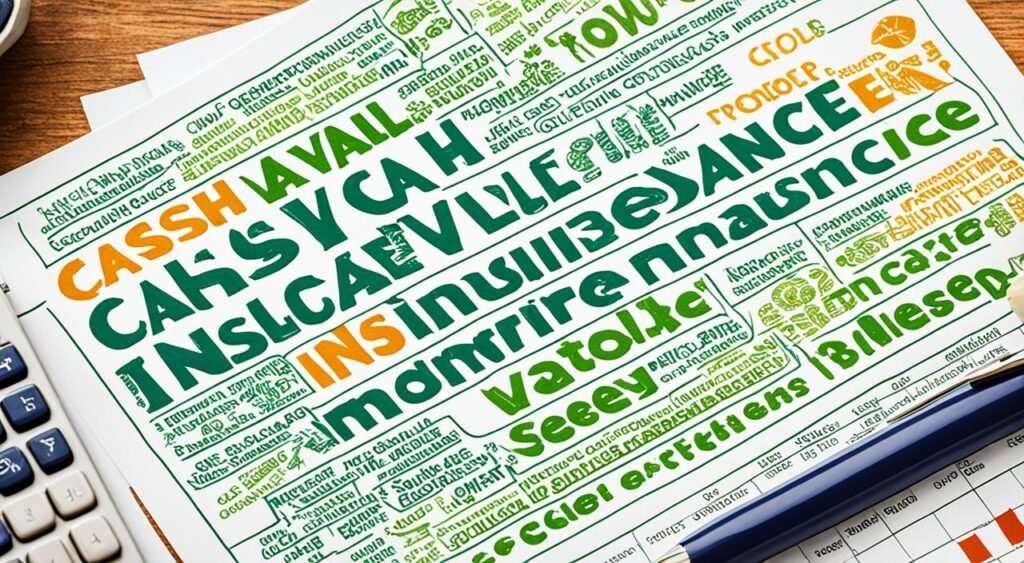Cash value life insurance is a special kind of permanent life insurance. It’s different from term life insurance because it offers more. It has a death benefit and a cash value that grows over time.
This cash value can be used for many things. You can use it to help with retirement, pay for big expenses, or in emergencies. It’s a way to make sure you have money when you need it.
This type of insurance is meant to last your whole life. When you pay your premiums, the money goes towards the death benefit and the cash value. The cash value grows because of investments that don’t get taxed right away.
You can take money out of the cash value when you need it. You can do this through loans or withdrawals. This makes it easy to get to your money when you’re alive.
Key Takeaways
- Cash value life insurance combines a death benefit with a cash value component that accumulates over time.
- The cash value can be accessed by the policyholder for various financial needs, such as covering expenses or supplementing retirement income.
- Cash value life insurance provides lifelong coverage and the potential for tax-deferred growth of the cash value.
- Policyholders have flexible access to the cash value through withdrawals or loans.
- Cash value life insurance is a type of permanent life insurance, in contrast to term life insurance which only provides coverage for a specific period.
Understanding Cash Value Life Insurance
Cash value life insurance is a type of permanent life insurance. It has a savings part called the cash value. This part is key, making it different from term life insurance, which only offers a death benefit.
Defining Cash Value Life Insurance
When you pay your life insurance premiums, part goes to insurance costs and part goes to the cash value account. This account grows over time with tax-deferred interest. This can increase the policy’s value.
The death benefit is there for your loved ones. But you can also use the policy’s cash value for things like bills or extra retirement money. This is a big plus of cash value life insurance, letting you use the money you’ve saved.
Cash value life insurance, also called permanent life insurance, is not like term life insurance. Term life insurance doesn’t have a cash value part. It only covers you for a certain time and doesn’t build up cash.
Also Read: Avila University: Where Your Dreams And Goals Align
Learning about cash value life insurance helps you decide if it fits your financial plans and needs.
Types of Cash Value Life Insurance Policies

There are several types of cash value life insurance policies to consider. These include whole life, universal life, variable life, and indexed life insurance. Each type has its own features and benefits. They cater to different financial needs and risk preferences.
Whole Life Insurance
Whole life insurance is a type of permanent life insurance. It provides coverage for your entire life and has a guaranteed cash value. The cash value grows over time. Policyholders can use this cash through withdrawals or loans.
This policy also offers a death benefit that stays in effect for your lifetime. It’s a popular choice for those seeking long-term financial protection.
Universal Life Insurance
Universal life insurance is more flexible than whole life insurance. You can adjust your premium payments and the death benefit amount as needed. The cash value in this policy depends on the investment performance.
Also Read: Masterpieces Of The Moment: A Dive Into Famous Modern Art
This type of policy is great for those who need a balance between death benefit coverage and cash value growth.
- Whole Life Insurance
- Universal Life Insurance
- Variable Life Insurance
- Indexed Life Insurance
| Policy Type | Death Benefit | Cash Value Growth | Premium Flexibility |
|---|---|---|---|
| Whole Life Insurance | Lifelong coverage | Guaranteed growth | Fixed premiums |
| Universal Life Insurance | Adjustable | Investment-based | Flexible premiums |
| Variable Life Insurance | Adjustable | Investment-based | Flexible premiums |
| Indexed Life Insurance | Adjustable | Index-based | Flexible premiums |
cash value life insurance

Cash value life insurance has many benefits that make it appealing to many people. It lets you save money over time with a cash value part. This cash value grows without taxes, helping you grow your wealth.
This type of insurance covers you for your whole life, not just for a set time like term insurance. So, your loved ones get the death benefit whenever they need it.
You can use the cash value of your policy for loans or withdrawals. This is great for when you’re facing financial trouble or unexpected bills.
Also Read: What Does Workers Compensation Insurance Covers?
Even though cash value life insurance costs more than term insurance, its long-term growth and cash access are big pluses. It’s a smart choice for building savings and securing your financial future.
| Benefit | Description |
|---|---|
| Cash Value Accumulation | Cash value life insurance policies allow policyholders to accumulate a cash value component that grows on a tax-deferred basis, providing a source of potential savings and wealth. |
| Lifelong Coverage | Unlike term life insurance, cash value life insurance policies offer coverage that lasts for the policyholder’s entire lifetime, ensuring the death benefit is available to beneficiaries. |
| Access to Cash Value | Policyholders can access the accumulated cash value through withdrawals or loans, providing financial flexibility when needed. |
Understanding the benefits of cash value life insurance helps people make better choices for their financial future.
Accessing the Cash Value

Cash value life insurance lets you use the money built up in your policy while you’re still alive. You can withdraw cash value for things like bills, extra retirement money, or other financial needs. But remember, taking money out will reduce the death benefit of your policy.
Also Read: Southeastern Oklahoma State University: A Gateway To Success
You can also take out loans on the cash value. These loans usually have good interest rates and can be taken out tax-free. Loans and withdrawals give you more control over your money. But, they will also cut down the cash value and death benefit of your policy.
Withdrawals and Loans
- Policyholders can withdraw cash value from the policy to cover expenses or supplement retirement income.
- Withdrawals will reduce the overall death benefit of the policy.
- Policyholders can take out loans against the cash value, which are typically offered at competitive interest rates.
- Loans can be structured in a tax-free manner, providing financial flexibility.
- Both loans and withdrawals will reduce the total cash value and death benefit of the policy.
| Feature | Withdrawal | Loan |
|---|---|---|
| Access to Cash Value | Yes | Yes |
| Reduces Death Benefit | Yes | Yes |
| Interest Charges | No | Yes |
| Tax Implications | Potentially Taxable | Tax-Free |
“Accessing the cash value of a life insurance policy can provide financial flexibility, but it’s important to understand the potential impact on the policy’s death benefit.”
Considerations for Cash Value Life Insurance

When thinking about cash value life insurance, it’s key to look at your financial goals and needs. If you want to make sure your loved ones are covered for life, this type of insurance is a good choice. It also lets you use the cash value if you need it during your life.
Also Read: What Are The Most Famous Art Museums In The World?
But, remember that cash value life insurance costs more than term life insurance. Make sure it fits into your long-term financial plans. Talking to a financial expert can help you decide if this is the right choice for you.
- Evaluate your financial goals and needs
- Consider the lifelong coverage provided by cash value life insurance
- Assess the ability to access the cash value during your lifetime
- Weigh the higher premiums of cash value life insurance vs. term life insurance
- Ensure the policy aligns with your long-term financial plan
- Consult a financial professional to determine the best life insurance option
“The true measure of a man is not how he behaves in moments of comfort and convenience, but how he stands at times of challenge and controversy.”
Also Read: What Are The Benefits Of Life Insurance Investments?
Conclusion
Cash value life insurance is a special kind of permanent life insurance. It has a death benefit and a cash value part. This lets people grow their wealth over time with tax-deferred earnings. They can also use the cash value for loans or withdrawals when needed.
Even though cash value life insurance costs more in premiums than term life insurance, it’s worth it for many people. It offers coverage for life and helps build wealth. People should think about their goals and needs to see if this policy is right for them.
This type of insurance combines savings with protection. It helps people reach their financial goals and also gives a death benefit to their loved ones. It’s important to look into all the details and features of this insurance before making a choice.
FAQs
Q: What is cash value life insurance?
A: Cash value life insurance is a type of permanent life insurance that includes a savings component, allowing the policyholder to build cash value over time. The cash value can be borrowed against or withdrawn, providing additional financial flexibility.
Q: How does cash value life insurance work?
A: Cash value life insurance works by accumulating cash value within the policy as you pay premiums. A portion of your premium goes towards the cash value, which grows tax-deferred over time. This cash value can be accessed through loans or withdrawals, but it may reduce the death benefit.
Q: What are the benefits of cash value life insurance?
A: The benefits of cash value life insurance include the ability to build cash value, tax-deferred growth, the option to borrow against the cash value, and a guaranteed death benefit. Additionally, some policies offer flexible premiums and investment options.
Q: Which type of life insurance offers cash value?
A: The type of life insurance that offers cash value includes whole life policies, universal life policies, indexed universal life insurance, and variable universal life policies. Each type has different features and growth potential for the cash value.
Q: Can I withdraw cash from my life insurance policy with cash value?
A: Yes, you can withdraw cash from your life insurance policy with cash value. However, withdrawals may reduce the policy’s death benefit and could incur taxes if the amount withdrawn exceeds the premiums paid.
Q: How do I know if cash value life insurance is right for me?
A: To determine if cash value life insurance is right for you, consider your long-term financial goals, budget for premiums, and need for insurance coverage. If you want a policy that builds cash value and provides lifelong coverage, it may be a suitable option.
Q: What is the cash surrender value of a life insurance policy?
A: The cash surrender value is the amount you would receive if you decided to surrender your life insurance policy with cash value before its maturity. It is typically less than the total cash value due to surrender charges and fees.
Q: Can I borrow against the cash value of my life insurance?
A: Yes, you can borrow against the cash value of your life insurance policy. Loans against the cash value are typically tax-free, but any unpaid loans will reduce the death benefit and cash value if not repaid.
Q: How does the cash value grow over time?
A: The cash value of life insurance grows over time through the accumulation of interest, which may be guaranteed or based on the performance of underlying investments, depending on the type of policy. Whole life policies generally offer stable growth, while variable life policies may fluctuate based on market performance.
Q: Where can I learn more about cash value life insurance?
A: To learn more about cash value life insurance, consider researching from reputable life insurance companies, speaking with a financial advisor, or checking insurance industry resources. This can help you understand the specific features, benefits, and options available in different policies.
Source Links
- https://www.aflac.com/resources/life-insurance/cash-value-life-insurance.aspx
- https://www.newyorklife.com/articles/cash-value-life-insurance
- https://www.investopedia.com/terms/c/cash-value-life-insurance.asp





